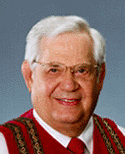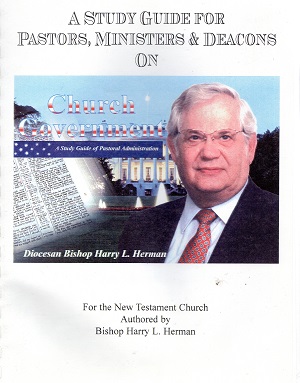By Harry L. Herman
To Order More, Click Here
Malachi 3:7-11
In considering the subject of tithes and offerings we often make the mistake of emphasizing only the tithes portion and very rarely do we stress the OFFERINGS. The charge is: You have robbed me of tithes AND OFFERINGS. Tithes were used principally for the Priest and Levites which are the equivalent of today’s ministry.
Offerings are used to support the house of God, to supply the maintenance and other needs of the church building, utilities, service requirements and etc. While we speak of a free will offering as a general offering for the church, there may be a number of special offerings for specific needs as well as pledges to offset major costs of purchase and repair.
Offerings are given according to the measure of God’s blessing of an individual and are not a fixed percentage as the “one tenth” or tithe. In fact offerings could well be MORE than tithes in some cases.
Num. 18:8 God placed on Aaron the responsibility of overseeing the money by reason of the anointing resting on him as the High Priest. The pastor has that same anointing and responsibility. The pastor is held accountable by God to use wisely the assets of the church treasury and is not to be foolish or wasteful just because there is money to be tried. God’s house deserves the best but it requires one who is prudent and a skilled manager of those assets in his or her control. Because God has called and ordained the pastor to be pastor, He is holding that pastor responsible for the entire business transactions of the church. The anointing rests upon the pastor by virtue of their office and not because of the person. It is needful in most cases to have a staff who can assist in church management in order to relieve the pastor for more spiritual duties, but the responsibility still belongs to the pastor.
“Honour the LORD with thy substance, and with the first fruits of all thine increase; So shall thy barns be filled with plenty, and thy presses shall burst out with new wine,” Prov. 3:9-10. These verses speak of three things: “Honor”, “Substance” and “Firstfruites”. To honor or give glory to God is to OBEY the commands He gives to us. In this verse, honoring God is through giving offerings and paying tithes. Substance is that part of our increase that remains after the tithes has been paid. It is from the substance that offerings various descriptions are given. Substance belongs to the individual for their use as they see fit. “Firstfruits” is the tithe. If one will be faithful in paying their tithes and generous in giving their offerings, God promised that they would be blessed in having the things that make them “full and happy”. Note also the instruction of Psalms 96:8. “Give unto the Lord the glory due unto his name: bring an offering and come into his courts.”
Moses was commissioned by God to build a “Sanctuary for Film”. This required building materials of all kinds along with gold, silver, brass, etc. and also precious jewels and fine linen to fulfil the vision of God’s sanctuary shown to Moses on the Mount. Before he could begin, Moses had to ask the people for offerings of all the things required to build the Sanctuary as directed. This material came from Egypt and was carried by the people into the wilderness. Now God was to put all these things to use and commands Moses to: “Speak unto the children of Israel, that they bring me an offering: of every man that giveth it willingly with his heart ye shall take my offering. And this is the offering which ye shall take of them; gold, and silver, and brass, And blue, and purple, and scarlet, and fine linen, and goats’ hair, And rams’ skins dyed red, and badgers’ skins, and shittim wood, Oil for the light, spices for anointing oil, and for sweet incense, Onyx stones, and stones to be set in the ephod, and in the breastplate. And let them make me a sanctuary; that I may dwell among them.” Exod. 25:2-8. How was Moses to acquire these things? By asking the people to bring them with a willing heart. This should be an answer to the critics who complain that “all the church does is ask for money”, seeing that it was God who in the beginning of constructing a structure for worship, asked for a freewill offering from the congregation.
Later, Ezra was given a similar command when the temple was in the process of being rebuilt. “Thus saith Cyrus king of Persia, The LORD God of heaven hath given me all the kingdoms of the earth; and he hath charged me to build him an house at Jerusalem, which is in Judah. Who is there among you of all his people? his God be with him, and let him go up to Jerusalem, which is in Judah, and build the house of the LORD God of Israel, (he is the God,) which is in Jerusalem. And whosoever remaineth in any place where he so journeth, let the men of his place help him with silver, and with gold and with goods, and with beasts, besides the freewill offering for the house of God that is in Jerusalem.” Ezra 1:2-4 Note the last part of verse 4. This offering was to be brought to Ezra BESIDE THE FREEWILL OFFERING FOR TIE HOUSE OF GOD. The offering that we give to the church is of an amount we choose to give, however, the special offering is given in ADDITION to our regular church offerings. One does not divide up the original offering into little pieces, but it is kept whole and other offerings are the “little pieces”. To pledge into the building fund, for example, is not at the expense of one’s regular offering, but an amount in addition to their regular offering.
The following verses are examples of the special offerings that were asked for.
“These we the feasts of the LORD, which ye shall proclaim to be holy convocations, to offer an offering made by fire unto the LORD, a burnt offering, and a meat offering, a sacrifice, and drink offerings, everything upon his day: Beside the Sabbaths of the LORD, and beside your gifts, and beside all your vows, and beside all your freewill offerings, which ye give unto the LORD.” Lev. 23:37-38 “And they received of Moses all the offering, which the children of Israel had brought for the work of the service of the sanctuary to make it withal. And they brought yet unto him free offerings every morning.” Exod. 36:3
“Freewill Offerings” Are Those Regular Offerings For The Maintenance And Supply Of “God’s House”.
“And thou shalt keep the feast of weeks unto the LORD thy God with a tribute of a freewill offering of thine hand, which thou shalt give unto the LORD thy God, according as the LORD thy God hath blessed thee: Every man shall give as he is able, according to the blessing of the LORD thy God which he hath given thee.” Deut. 16:10, 17
“Now therefore perform the doing of it; that as there was a readiness to will, so there may be a performance also out of that which ye have. For if there be first a willing mind, it is accepted according to that a man hath; and not according to that he hath not” 2 Cor. 8:11-12
“When thou shalt vow a vow unto the LORD thy God, thou shalt not slack to pay it: for the LORD thy God will surely require it of thee and it would be sin in thee. But if thou shalt forbear to vow, it shall be no sin in thee. That which is gone out of thy lips thou shalt keep and perform; even a freewill offering, according as thou hast vowed unto the LORD thy God, which thou hast promised with thy mouth.” Duet 23:21-23.
The above scriptures are to be studied as they give the description of “freewill offering” and the attitude by which they are to be given. In summary they speak of giving as God has blessed; give according to one’s ability; give-with a willing mind; do not let emotions govern your giving, if you don’t have it, don’t promise it; finally, if you make a promise to give (pledge, etc.), then pay what you have vowed
“And Jehoash said to the priests, All the money of the dedicated things that is brought into the house of the LORD, even the money of every one that passeth the account, the money that every man is set at, and all the money that cometh into any man’s heart to bring into the house of the LORD, Let the priests take it to them, every man of his acquaintance: and let them repair the breaches of the house, wheresoever any breach shall be found” 2 Kings 12:4-5 This verse deals with a repair problem and each one set fir themselves a certain amount toward repairing the house of God. This is the same as making a pledge. “Also we made ordinances for us, to charge ourselves yearly with the third part of a shekel for the service of the house of our God; For the shew-bread, and for the continual meat offering, and for the continual burnt offering, of the Sabbaths, of the new moons, for the set feasts, and for the holy things, and for the sin offerings to make an atonement for Israel, and for all the work of the house of our God “Nth_ 10: 32- 33 In addition to the previous verse, the Levites were to charge themselves or using the procedure of today, they were to “pledge” to give a certain amount of their “income” to provide for the necessary items used in the Temple worship. For a pastor to think he or she is exempt from this kind of giving is mistaken and is under the same obligation that the people must live by.
“And thou shalt take the atonement money of the children of Israel, and shalt appoint it for the service of the tabernacle of the congregation; that it may be a memorial unto the children of Israel before the LORD, to make an atonement for your souls.” Exod. 30:16. There are special offerings taken for specific purposes and they must be used for that purpose.
“And it came to pass after this, that Joash was minded to repair the house of the LORD. And he gathered together the priests and the Levites, and said to them, Go out unto the cities of Judah, and gather of all Israel money to repair the house of your God from year to year, and see that ye hasten the matter. Howbeit the Levites hastened it not. And the king called for Jehoiada the chief, and said unto him, Why halt thou not required of the Levites to bring in out of Judah and out of Jerusalem the collection, according to the commandment of Moses the servant of the LORD, and of the congregation of Israel, for the tabernacle of witness?” 2 Chronicles. 24:4-6. Those who are assigned a work or service in the House of God must give an accounting of the finances they receive to do the work. If they fail, they will be called into question and action will be taken against them. Dilatory attitudes should not be tolerated in the management of God’s House (the church).
When we give unto the Lord or make a vow to offer something to the church it should involve some sacrifice on our part. David, when he wanted to build an altar to offer sacrifices to God was offered the threshing floor of Araunah’s as a gift, but David refused to accept it because “it did not cost him anything”. “And the king said unto Araunah, Nay; but I will surely buy it of thee at a price: neither will I offer burnt offerings unto the LORD my God of that which doth cost me nothing. So David bought the threshingfloor and the oxen for fifty shekels of silver.” 2 Sam. 24:24 This should be a lesson for us in determining the generosity of our offerings to the church There should be some “sacrifice” when one gives.
It is not always how much (quantity) one gives, but the motive and attitude behind the giving. Jesus points out the widow woman who gave two mites, all that she had, which in God’s sight was more than the abundance of the rich. As a rule, those with less often give more proportionally than those who have much. “And Jesus sat over against the try, and beheld how the people cast money into the treasury: and many that were rich cast in muck. And there came a certain poor widow, and she threw in two mites, which make a farthing. And he called unto him his disciples, and saith unto them, Verily I say unto you, that this poor widow bath cast more in, than all they which have cast into the treasury: For all they did cast in of their abundance; but she of her want did cast in all that she hard even all her living.” Mark 12:41-44 God loves the cheerful giver and is adverse to the stingy one who is tight with their substance. If one does not sow many seeds, they not reap a bountiful harvest. Little given, little received. “But this I say, He which soweth sparingly shall reap also sparingly; and he which soweth bountifully shall reap also bountifully. Every man according as he purposeth in his heart, so let him give; not or of necessity: for God loveth a cheerful giver. And God is able to make all grace abound toward you; that ye, always having all sufficiency in all things, may abound to every good work:” 2 Cor. 9:6-8.
Remember: The Other Offerings We Give Are Not To Be Given At The Expense Of Our Regular Church Offering.
The following scriptures illustrate the blessings of liberality.
“The liberal soul shall be made fat: and he that watereth shall be watered also himself. Prov. 11:25 “Give, and it shall be given unto you; good measure, pressed dawn, and shaken together, and running over, shalt men give into your bosom. For with the same measure that ye mete withal it shall be measured to you again.” Luke 6:38
“Be not rash with thy mouth, and let not thine heart be hasty to utter anything before God: for God is in heaven, and thou upon earth: therefore let thy words be few.” Eccl. 5:2. This verse warns against being overtaken by emotions and promising more than one can deliver. When pledges are asked for, be generous but also be sensible. Pledge within your ability for God will hold everyone accountable for their failed promises.
Paul, knowing that there were some severe deficiencies in Jerusalem where the church was in dire need, organized an offering to be taken on a regular basis and set aside to be taken to the church at an appointed time. This illustrates the need for some sort of organized giving for the poor and other localities in need. During the time of national disaster, churches have collected monies to help alleviate the suffering of those who suffer in these disasters, be it flood, fire, or windstorm. Perhaps the best example of this special organized collection is Foreign Missions Offering collected by churches in the Pentecostal Assemblies of the World each second Sunday of the month for the International Missions Dept. “Now concerning the collection for the saints, as I have given order to the churches of Galatia, even so do ye.” 1 Cor. 16:1
The Heave Offerings: (Gifts to God) those offerings which the children of Israel voluntarily gave or which was prescribed by the law. These offerings were separated from what was theirs and presented (given) to God, not as a sacrifice, but as an offering.
A personal note: These principles have been applied in the church where I pastor which consists of a small congregation. Every need has been met, the church is paid for along with many major improvements. Christ Temple has fulfilled all its organizational requirements completely and has been able to assist other churches as well as helping other pastors in need. My personal needs have been satisfied without the aid of a Pastors Aid or an outside job. Church dinners, selling campaigns or any other special way to get finance have not been necessary to support the church or the ministry. Tithes and offerings are the only source of income for Christ Temple, Kalamazoo, but God has blessed in a tremendous way because the people have been taught and have obeyed and they are blessed. When the people are blessed, the church will be blessed also.
Note to the readers: All scripture are from the King James Version of the Bible.
Recommended reading:
Christian Stewardship by Bishop G. T. Haywood
God’s Financial Plan for The Church by Bishop Ross P. Paddock
The original booklet: “Church Government” was Expanded and Revised: February 1997
Bishop Harry L. Herman D.D., Th.D.
A Special Seminar for Pastors, Ministers and Deacons
The above article, “Offerings unto the Lord” was written by Harry L. Herman. The article was excerpted from Herman’s book A Study Guide for Pastors, Ministers, & Deacons on Church Government.
The material is copyrighted and should not be reprinted under any other name or author. However, this material may be freely used for personal study or research purposes.
To Order More, Click Here





1 thought on “Offerings Unto the Lord (Entire Article)”
Comments are closed.